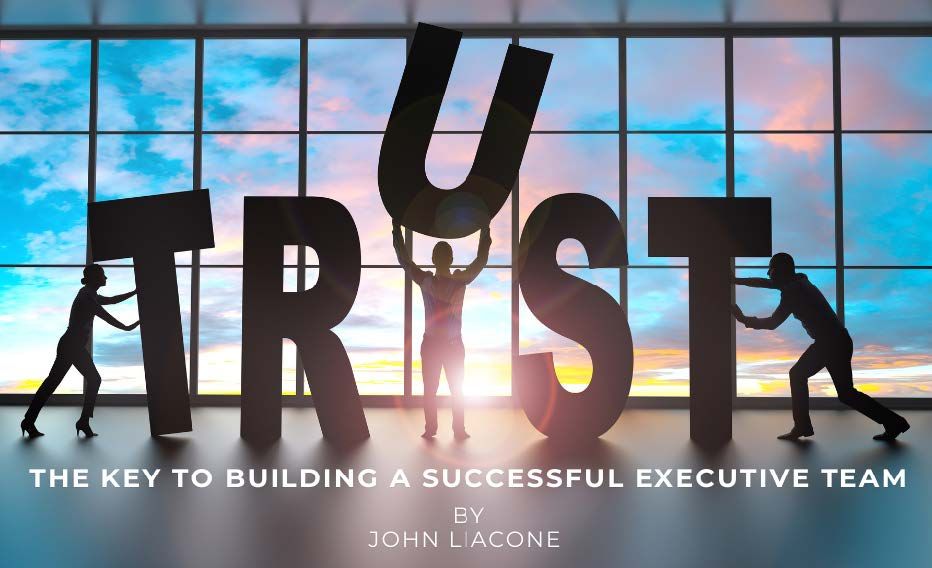Trust: The Key to Building a Successful Executive Team

Giants fall. The Roman, Incan & British Empires did. So did Enron, Sears & Sprint. A lack of
trust has been the downfall of empires and corporations throughout history. But why?
In the dynamic world of corporate leadership, one undeniable truth emerges: trust is the bedrock of successful high-power executive teams. While strategy, innovation, and vision are essential for any business, trust binds a team together, fostering an environment where collaboration thrives and mutual goals are achieved.
But as with Rome, trust can’t be built in a day. There must be communication – some of it probably uncomfortable – to develop trust and mutual respect. But that’s only the beginning of the hard work that must be done. Trust requires transparency, authenticity, and honesty at all levels and the executive team must enable and lead that conversation.
Building a Foundation of Confidence: How can any company - doing business anywhere in the world – ask their clients and customers to trust them when they don’t trust themselves? Trust must begin with building confidence among team members. Executives must believe their colleagues are focused not just on personal ambitions but on the overarching goals of the company. When decisions are made with the best interests of the organization, shareholders, and employees in mind, a strong foundation for collaboration is established. Leaders who trust one another create a culture where open communication flourishes and everyone feels empowered to contribute.
To cultivate a culture of trust, leaders must prioritize transparency and honesty in their interactions. They should encourage open dialogue and create spaces where team members feel safe to express their thoughts and concerns without fear of judgment. Additionally, fostering accountability within the team helps reinforce the trust that each member has in one another, creating a sense of shared responsibility.
We’ve all heard the “only as strong as its weakest link” metaphor. But companies are made up of humans – not chains - and humans are inherently resilient and are imbued with a biological desire to work together. So, if humans who share a common vision and purpose aren’t working together – trusting each other – there must be a change in the culture.
"Trust is like the air we breathe - when it's present, nobody really notices. When it's absent, everyone notices." - Warren Buffett
Alignment with Vision and Values: A company’s “culture” is essentially a shared perspective on its vision and values. This is crucial for the executive team to both define and support. Members must align with the company's vision and values, which guide every decision and action. When executives live and breathe the company’s culture, they create a unified front that can navigate both opportunities and challenges. This alignment serves as a compass, directing the team toward their common objectives and reinforcing their commitment to one another.
Support in Challenging Times: It’s easy to operate seamlessly in an environment of success, but the true test of an executive team's trust emerges during challenging times. High-functioning teams understand that setbacks are a part of the journey. In these moments, supporting one another becomes crucial. Leaders who trust each other will rally together, leveraging their strengths to overcome obstacles, ensuring that they not only survive but thrive as a cohesive unit.
The Essence of Trust: Dr. Henry Cloud, in his insightful book "Trust," delves deeper into the multifaceted nature of trust within teams. He emphasizes that trust isn’t a static element; it’s dynamic and requires intentionality. According to Dr. Cloud, understanding when to give trust, when to withhold it, how to earn it, and the strategies to repair it if broken are vital components of a successful team dynamic. Recognizing these nuances can help leaders cultivate a robust environment where trust can flourish.
Building a Culture of Trust: It’s been said that Rome fell due to a widespread loss of trust among its citizens leading to a lack of loyalty and a feeling that the leadership could not be relied upon to protect the empire's interests.
We all want to succeed and the most successful companies and executive teams are united by a profound sense of trust. It begins with a firm belief in each other's intentions and capabilities, thrives on a shared vision, endures through challenges, and is nurtured through intentional actions. By embracing these basic principles, leaders can not only foster a culture of trust but also pave the way for success through collaboration and mutual support. In the end, trust is not just an element of leadership; it’s the very essence of it.
The Overture Group's mission is to provide your company with the expertise you need in an ever changing middle market to recruit and retain executive and professional positions through search and compensation consulting. Reach out to let us help you find your next executive.